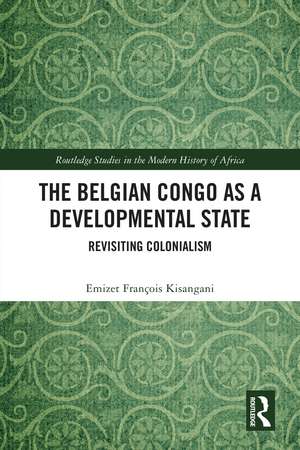The Belgian Congo as a Developmental State: Revisiting Colonialism: Routledge Studies in the Modern History of Africa
Autor Emizet François Kisanganien Limba Engleză Paperback – 27 mai 2024
The book demonstrates that despite the colonial system’s economic exploitation and extraction, brutality, excessive taxation, and inequities, the Belgian Congo achieved successes in developing the economy in a short period of time. The Belgian Congo was able to achieve this by investing its higher rates of fiscal revenue in political stability, physical infrastructure, education, and healthcare. By reconsidering the Belgian colonial state as a developmental state, this book encourages scholars to adopt a more nuanced analysis of African history. Considering state capacity and state autonomy as key features of a developmental state, the book demonstrates that colonial state managers in the Belgian Congo were able to supply these public goods that sustained economic growth for decades. Whilst by no means glorifying colonialism or the atrocities that were conducted during the Belgian occupation, the book nonetheless outlines how different forms of capitalism were deployed to further economic development in the country. In contrast, predatory state managers of the Congo Free State (1885–1908) and post-colonial kleptocrats (1960–2018) have squandered Congo’s natural resources with disastrous economic and social consequences.
Contrasting the Belgian Congo with colonies of settlement and other colonies of extraction, this book encourages researchers and students to reconsider the dominant narratives within colonial history, development, and African Studies.
| Toate formatele și edițiile | Preț | Express |
|---|---|---|
| Paperback (1) | 311.41 lei 3-5 săpt. | +22.67 lei 7-11 zile |
| Taylor & Francis – 27 mai 2024 | 311.41 lei 3-5 săpt. | +22.67 lei 7-11 zile |
| Hardback (1) | 937.04 lei 3-5 săpt. | +28.21 lei 7-11 zile |
| Taylor & Francis – 31 aug 2022 | 937.04 lei 3-5 săpt. | +28.21 lei 7-11 zile |
Din seria Routledge Studies in the Modern History of Africa
-
 Preț: 386.43 lei
Preț: 386.43 lei -
 Preț: 198.68 lei
Preț: 198.68 lei -
 Preț: 383.12 lei
Preț: 383.12 lei -
 Preț: 389.38 lei
Preț: 389.38 lei - 19%
 Preț: 259.72 lei
Preț: 259.72 lei -
 Preț: 389.66 lei
Preț: 389.66 lei - 20%
 Preț: 260.45 lei
Preț: 260.45 lei - 19%
 Preț: 256.85 lei
Preț: 256.85 lei -
 Preț: 389.66 lei
Preț: 389.66 lei -
 Preț: 387.20 lei
Preț: 387.20 lei -
 Preț: 385.62 lei
Preț: 385.62 lei - 17%
 Preț: 246.84 lei
Preț: 246.84 lei -
 Preț: 309.79 lei
Preț: 309.79 lei -
 Preț: 393.63 lei
Preț: 393.63 lei -
 Preț: 312.86 lei
Preț: 312.86 lei - 18%
 Preț: 1002.18 lei
Preț: 1002.18 lei - 18%
 Preț: 1000.13 lei
Preț: 1000.13 lei - 18%
 Preț: 1006.77 lei
Preț: 1006.77 lei - 18%
 Preț: 945.67 lei
Preț: 945.67 lei - 18%
 Preț: 1060.11 lei
Preț: 1060.11 lei
Preț: 311.41 lei
Nou
Puncte Express: 467
Preț estimativ în valută:
59.60€ • 64.71$ • 50.06£
59.60€ • 64.71$ • 50.06£
Carte disponibilă
Livrare economică 01-15 aprilie
Livrare express 18-22 martie pentru 32.66 lei
Preluare comenzi: 021 569.72.76
Specificații
ISBN-13: 9781032254319
ISBN-10: 1032254319
Pagini: 276
Ilustrații: 40
Dimensiuni: 156 x 234 x 20 mm
Greutate: 0.45 kg
Ediția:1
Editura: Taylor & Francis
Colecția Routledge
Seria Routledge Studies in the Modern History of Africa
Locul publicării:Oxford, United Kingdom
ISBN-10: 1032254319
Pagini: 276
Ilustrații: 40
Dimensiuni: 156 x 234 x 20 mm
Greutate: 0.45 kg
Ediția:1
Editura: Taylor & Francis
Colecția Routledge
Seria Routledge Studies in the Modern History of Africa
Locul publicării:Oxford, United Kingdom
Public țintă
PostgraduateCuprins
1. An overview of the argument, 2. The Leopoldian State and economy of plunder, 3. Political order and rule of law in the Belgian Congo, 4. Belgian Congo and basic infrastructure for economic development, 5. Property rights and economic development, 6. Revenue imperative, state building, and economic development, 7. From Mobutu to Mobutu and hubris syndrome, 8. From an anarchic to a criminal state, 9. The Belgian Congo state in comparative perspective, Conclusion
Notă biografică
Emizet François Kisangani is Professor in the Department of Political Science and the Graduate Program in Security Studies, Kansas State University, USA.
Descriere
This book challenges assumptions that poor post-colonial economic performance is always a direct product of colonialism by reconsidering the Belgian Congo (1908-1959) as a developmental state. It encourages researchers and students to reconsider the dominant narratives within colonial history, development, and African Studies.
